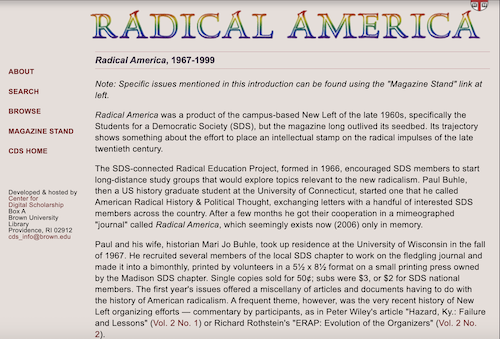Dan Georgakas, a Personal Reminiscence
by Paul Buhle
My late, dear friend Dan Georgakas developed a unique pattern of work with me, and personal friendship as well, close at times and almost lost at other times, over the period from 1968 to the time of his passing. To say I valued him enormously would be an understatement: he made possible some of the best and most rewarding work that I have ever been able to do, and during many times of stress, added his good humor and keen observations to buoy my moods.

We met by (snail) mail, only intermittently in person. He was drawn to my new left magazine Radical America (1967-1999), and edited largely by myself only between1967 and 1973, from Madison, Wisconsin. By 1968, he became an Associate Editor, and I believe his name remained on the masthead of the magazine until its demise in 1999. We corresponded at great length as we got to know each other, and he advised on many things, political and cultural, along the way.
His most unique contribution, perhaps, was bringing poetry of a very current political moment to me for publication. The black poetry of Sonia Sanchez and Etheridge Knight (serving a prison sentence in Indiana) but also of “Street Poetry” around the social uprisings in Detroit, helped flesh out the magazine as more than history or politics. He knew the Detroit circle around the following of CLR James intimately, and helped the magazine establish a close relation with a milieu that offered a unique, pro-working class but non-vanguard outlook closer perhaps to the traditions of the Industrial Workers of the World than any other. He also drew to us a range of contacts, writers, subscribers and other people interested in one issue or another, free of orthodoxy found too often in Left circles. The papers of Radical America, at the Wisconsin Historical Society, contains many letters from him.
These halcyon years, easing if not ending with the move of the magazine to Somerville, Massachusetts, in 1971, and my easing out of its editorial operation by late 1973, turn out to have been the introduction to a larger engagement.
In 1975, I founded the Oral History of the American Left at Tamiment Library. By 1982, we had received a grant from the National Endowment of the Humanities for a considerable series of interviews with older, mostly octogenerian leftwingers, from a wide variety of ethnic backgrounds and locations across the country. As a part-time staffer, from and around Taminent at New York University, he helped organize the interviews and assorted data, taking upon himself the specific work of encouraging documentary filmmakers working on topics around the history of the Left to turn over their “out takes” to the OHAL collection. He also conducted invaluable interviews with old time activists in Detroit, especially, but also among Greek American radical veterans.

This work led to several small projects, including the volume entitled The Immigrant Left in the United States (1994), an anthology that he co-edited with me. It also led to the single largest project of my life: The Encyclopedia of the American Left. Deciding in 1987 or 1988 to take on this unprecedented work involving hundreds of writers and a handful of prestigious advisors, prospective co-editor Mari Jo Buhle and I looked naturally to Dan as our third editor. This thousand-page volume (1,400 pages by the third edition) took years of our time and energies, and each editor assumed large responsibilities for assembling and analyzing possible topics (including personalities of the Left) across the widest possible swath of gender, race and ethnicity. When the first edition appeared in 1990, we could proudly say that this large-scale collaboration offered a view hitherto impossible.
Dan’s background and involvement in the Greek American community was a key to his involvement here. He had, by background and experience, a keen sense not only of the Greek American Left, but also how other immigrant groups large and small had created leftwing movements socialist, anarchist and communist, in the generations before assimilation and to a degree, after as well.
And to add his own unique understanding of the African American Left over the passage of generations and different affiliations of the Left. Previous histories of the socialists and communists had largely been histories of leaders and writers, with little attention to life and work at the community level. We were not the only ones seeking “history from the bottom up,” but in our sphere of work, we offered much information, insight, and a tribute to all those who had struggled against the odds, managed to build unions, cultural associations, and parties where they lived and worked.
The Encyclopedia, as it reached a second edition in 1998, notably at Oxford University Press, became our continuing link, in part because we had more work to do in revisions and new editions, but also because the work kept us in touch. Oddly, because mostly indirectly, his longtime involvement with film journalism and film scholarship led me to engage in the interviewing of the survivors of the Hollywood Blacklist and to five volumes on the Black listees and their work, before, during and after the Blacklist. Dan’s interests had helped show me the way forward in my own. He remained engaged with topics in the Encyclopedia until the last months of his life, as we prepared the Third Edition.
Others will write properly on his totemic volume Detroit, I Do Mind Dying. I can only say that I found it inspiring and was happy to assign it to my classes.
Paul Buhle, founding editor of the magazine RADICAL AMERICA, co-editor with
Dan of The Encyclopedia of the American Left; and co-editor with
Dan of The Immigrant Left.
